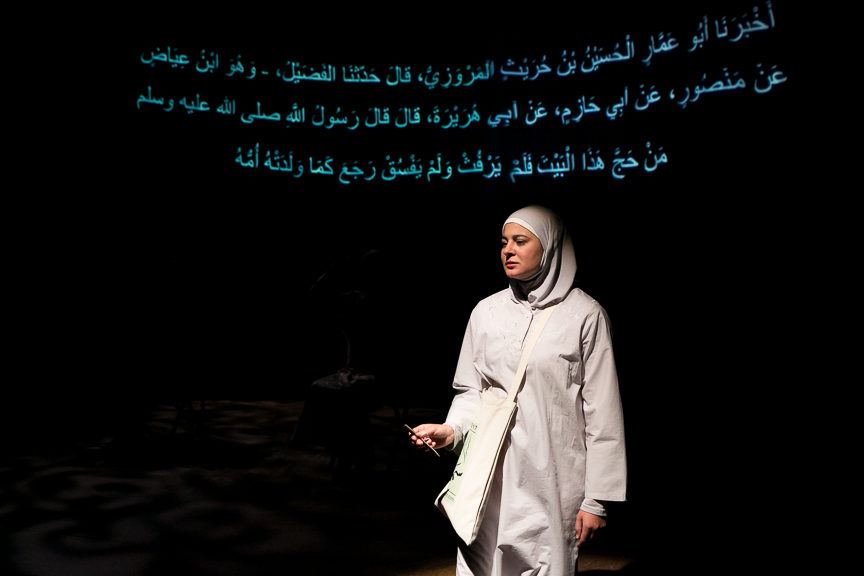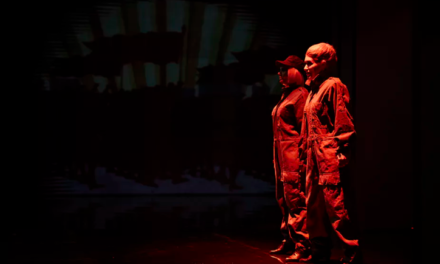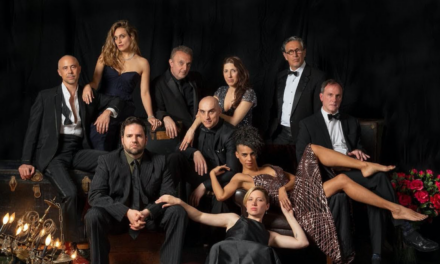The Mecca Tales is an essential new work of theatre by emerging Chicago-based playwright Rohina Malik. As the title suggests, “Mecca” details a religious pilgrimage, in this case featuring five Muslim women, all with compelling backstories.
What distinguishes “Mecca” is the crisp writing and consistently taut acting of five women and one man. Louis Sallan, the sole male actor, plays numerous roles with astonishing nuance. The women likewise double up to play characters in various tableaux which organically morph out of the present tale of the pilgrimage, or Hajj, of these five women.
The deep stage of New York’s Sheen Center is rendered as a cozy, black arc which evocatively envelops the actors whilst effectively focusing the action. The fact of technical difficulties on opening night, which found the actors playing without the benefit of numerous slide projections, did not appear to distract either the players or the audience. Thankfully, the play has sufficient meat on its bones to flourish with otherwise modest scenic embellishments.
The actors deserve much credit for carrying this potent story without benefit of the aforementioned video projections. The brooding, atmospheric music is wonderfully effective while never being too loud or distracting. The lighting effects, rendered on the sun dial-like stage, are likewise employed with a gentle, assured hand.
The opening of the play finds the actors poking out behind black curtains in a choreographed motif which helps evoke the sense of flowing tents referenced in the text, later revealed onstage. The costumes are muted, intricately embroidered shift-like dresses with long sleeves. All feature subtle hues of palest lavender, blue, and cream, modestly tailored.
The direction, by Kareem Fahmy, likewise deserves praise for seamlessly shepherding the actors through their scenes with an assured sense of utilizing the full depth of the Sheen Center’s compact stage. The flashback scenes are likewise evocative thanks to dynamic lighting, committed performances, and nuanced blocking of scenes in various nooks of the stage.
While all the actors deserve unrestrained praise, Mariam Habib merits honorable mention for her commanding climactic scene. Habib’s emotional state percolates throughout the play, suggesting the promise of a payoff later in the story. She does not disappoint and it is the anticipation of just this sort of catharsis which audibly moved several audience members to hanky-damping.
The fact of a Muslim woman writing a major play centered on five female Muslims is noteworthy in and of itself. Whatever the precedent for such an achievement, Rohina Malik renders a script with an unmistakable sense of mystery and mysticism which does not easily lend itself to comparison or placement in the modern western theatrical canon. The fact of the significance of The Mecca Tales rests squarely on the strength of the writing, acting and directing. The absent video projections disable a more thorough evaluation of the production’s technical merits.
The modern play which is The Mecca Tales’ most evident topical antecedent is Brian Friel’s celebrated Dancing At Lughnasa, the story of a group of adult sisters whose lives are constrained by societal strictures; in this case, due to their existence in 1930’s rural Ireland.
Malik’s formal precursor is less easily ascertained. The spiritual, mystical elements suggest the work of Latin American magical realistic fiction more than a specific dramatic genre. Pulitzer Prize winner Nilo Cruz’s Anna In The Tropics may be the closest cousin to Mecca. It’s altogether likely that Latin American and Muslim playwrights will emerge as creators of new genres of contemporary playwriting which Cruz and Malik may help bring to national attention in the near future.
For now, we have the jewel which is The Mecca Tales, in a co-production between the Voyage Theater and Crossroads Theatre Companies. A timely, compelling play, Mecca should be seen far and wide.
The Mecca Tales is at the Sheen Center at 18 Bleecker Street in New York City.
This post was written by the author in their personal capacity.The opinions expressed in this article are the author’s own and do not reflect the view of The Theatre Times, their staff or collaborators.
This post was written by Jack Wernick.
The views expressed here belong to the author and do not necessarily reflect our views and opinions.


















